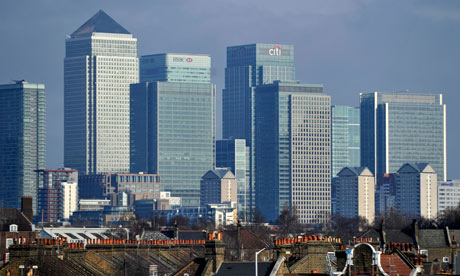Banks threaten to leave London over measures to prevent another bailout
Commission's plans unlikely to include breaking up institutions, but banks 'may still quit UK'

The report is expected to back away from splitting up high street banks from their investment banking divisions. Photograph: Andy Rain/EPA
A government commission is to unveil measures aimed at ensuring taxpayers will never again need to bail out Britain's banks, with recommendations that risk splitting the coalition and infuriating the banking sector.
Amid warnings from large banks such as Barclays, HSBC and Standard Chartered that they will leave London if the proposals by Sir John Vickers are too radical, the commission will seek to ringfence savers from riskier banking operations.
The commission has considered the potential impact of its proposals on the City and is expected to counter suggestions that they would encourage banks to move to New York or Hong Kong.
The report, thought to run to 200 pages, was handed to ministers late on Friday to be presented to the banks at 6am on Monday – an hour before its official release. It is expected to back away from proposals such as "narrow banks", which only take savings, and splitting high street banks from their investment banking divisions, which Vince Cable, the business secretary, previously alluded to as "casinos".
But it sets out a handful of ideas to avoid another taxpayer bailout and bolster competition on the high street in the wake of the rescue of HBOS by Lloyds, which was only permitted because Labour overrode competition concerns.
Crucially, Vickers and his four commissioners have looked at ways banks can bolster their capital through new types of loss-absorbing financial instruments. They are concerned that the capital held by banks before the crisis – largely equity – was too brittle and lacked the flexibility of other types of instruments that might be more effective incushioning the blow of multibillion-pound losses.
Danny Alexander, the Lib Dem chief secretary to the Treasury, told the BBC : "Our priority as a government is to make sure that those people who recklessly gambled with our economy are no longer able to be bailed out by taxpayers.
"That's why this commission is looking at separation issues within the banking system to make sure that the bits that are valuable to us as an economy, retail banking and so on, could be protected, whereas those people who engage in that sort of casino banking take responsibility for themselves."
Sources close to Cable, the business secretary, and the chancellor,George Osborne, were this weekend trying to stifle suggestions of a rift between them over banking reform, which was the first item on the coalition agreement.
Government sources noted that the combined balance sheet of Britain's banks is still five times that of the British economy. "We have to get this right," one said, pointing out that both Ireland and Iceland had economies dwarfed by the size of their banks.
Although the commission is thought to have concluded that any suggestion of a full-break up the banks is not necessary, some of the ideas could have a similar impact. Vickers is known to have considered so-called subsidiarisation, which requires major banks to ringfence funds inside individual parts of the group.
There are three main options: geographic, where business activities are segregated based on their domicile; functional, where business activities are segregated based on nature of business and client; and operational, where critical operations such as cash are segregated.
RBS is the only bank to have made a public estimate about the cost of being a universal bank – putting it at between £3.5bn and £4.8bn annually – and analysts at Goldman Sachs believe Barclays has most to lose.
Lord Oakeshott, the Liberal Democrat peer who resigned as party spokesman over the lax treatment of banks, said: "It's in the whole City's interest – not just the banks' – that real bank reform makes London the world's most trusted financial centre, instead of a British version of Las Vegas. Calling the banks' bluff would be best business decision our government could make."
Although the interim report is being closely watched by the banks, any overhaul is unlikely to take place until 2012. A final report is due in September and will be considered by a cabinet committee chaired by Osborne. The presence of the former HSBC chairman Stephen Green, now a trade minister, on this cabinet committee has caused some controversy.
No comments:
Post a Comment